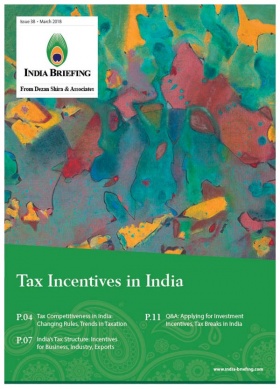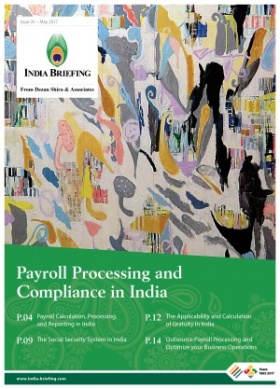The Disabilities Act in India: What Employers Need to Know
The Rights of Persons with Disabilities Act, 2016 along with the Rules (for implementation) have recently been enacted by the federal government. The new law protects disabled persons in India from various forms of discrimination, ensures their access to equal employment opportunities, and enhances their societal participation.
The Disabilities Act of 2016 is in accordance with the principles codified in the United Nations Convention on the Rights of Persons with Disabilities, and replaces the previous legislation – Persons with Disabilities (Equal Opportunity Protection of Rights and Full Participation) Act of 1995.
This article highlights the key features of the new law and identifies its impact on doing business in India.
Salient aspects of the Disabilities Act, 2016
The definition of a ‘disabled person’ is broadened under the 2016 Act: it covers persons with disability, persons with benchmark disability, and persons with disability having high support needs. This definition is inclusive and categorizes 21 types of disabilities as ‘specific disabilities’.
The Act applies to government establishments as well as private establishments. Under the law, private establishments refer to a company, firm, cooperative or other society, associations, trust, agency, institution, organization, union, factory, or such other establishment specified by the government.
The Act requires all establishments to frame and publish an Equal Opportunities Policy. All forms of discrimination against persons with disabilities are prohibited, unless it can be proved that such discrimination is proportionate in nature and a necessary means of achieving legitimate purposes.
The Act provides additional benefits for persons with benchmark disabilities, such as employment vacancies in government establishments, education opportunities, land allocation, and poverty alleviation schemes, among others.
In order to ensure speedy justice, special courts are instituted in each district to deal with cases pertaining to the violation of the rights of disabled persons. Penalties for the violation of rights of disabled persons can extend to a monetary fine of US$7,750 (Rs 500,000) and imprisonment for up to five years.
Key compliances under the Disabilities Act
Although the majority of the compliances under the Act apply exclusively to government establishments, private establishments are also covered under the purview of the Act and must comply with the following requirements:
- Frame and publish an Equal Opportunities Policy on the establishment’s website or at a conspicuous place within the establishment premises. The Policy must contain details of the benefits and facilities provided to disabled persons at the workplace. A copy of the Policy must also be registered with the State Commissioner.
- Establishments having more than 20 employees must appoint a Liaison Officer to oversee the recruitment of disabled persons and special facilities provided for them.
- Establishments are required to identify job vacancies, which would be appropriate for disabled persons. In case of establishments receiving incentives from the government, a minimum of five percent of job vacancies must be compulsorily reserved for disabled persons.
- The employer must ensure the prohibition of illegitimate discrimination against disabled persons within the workplace.
- The employer must provide additional facilities or special benefits to disabled employees in order to increase their accessibility, such as special leave and training programs.
- All establishments have to conform to the accessibility norms issued by the government regarding disabled persons. The accessibility norms pertain to workplace infrastructure and communication technologies, which must be accessible to disabled persons.
- Every covered establishment must maintain records of its disabled employees.
Impact on doing business in India
Compliance with the Disabilities Act will naturally involve revamping internal recruitment policies. For instance, the company’s human resource (HR) team must be careful to incorporate policies designed to benefit disabled persons. Further, firms can increase their profitability by strategically aligning their policies to suit the special needs of disabled persons.
In recent years, several private firms in India operating in the IT and services sector have been hiring disabled persons to fill various vacancies. In many instances, such hiring practices not only fulfil ethical compliances but also make sense from a business perspective. HR managers have identified several benefits of hiring disabled persons. Firms like IBM, Coca Cola, Google, and Lemon Tree Hotels have developed dynamic workplaces after reforming hiring practices.
The Act also provides firms with an additional avenue of fulfilling their corporate social responsibility (CSR) activities. Firms can deploy more financial resources towards mandatory CSR schemes by providing benefits to disabled persons.
Hiring and retaining disabled persons is an important ethical compliance, and HR managers must ensure that the workplace and company policies are conducive to a healthy work environment for disabled persons.
About Us
India Briefing is published by Asia Briefing, a subsidiary of Dezan Shira & Associates. We produce material for foreign investors throughout Eurasia, including ASEAN, China, Indonesia, Russia, the Silk Road, & Vietnam. For editorial matters please contact us here and for a complimentary subscription to our products, please click here.
Dezan Shira & Associates provide business intelligence, due diligence, legal, tax and advisory services throughout India and the Asian region. We maintain offices in Delhi and Mumbai and throughout China, South-East Asia, India, and Russia. For assistance with India investment issues or into Asia overall, please contact us at india@dezshira.com or visit us at www.dezshira.com.
- Previous Article Expatriates in India: Visa, Work Culture, Socioeconomic, and Payroll Considerations
- Next Article India’s Free Trade and Double Tax Agreements – New Issue of India Briefing Magazine Out Now













